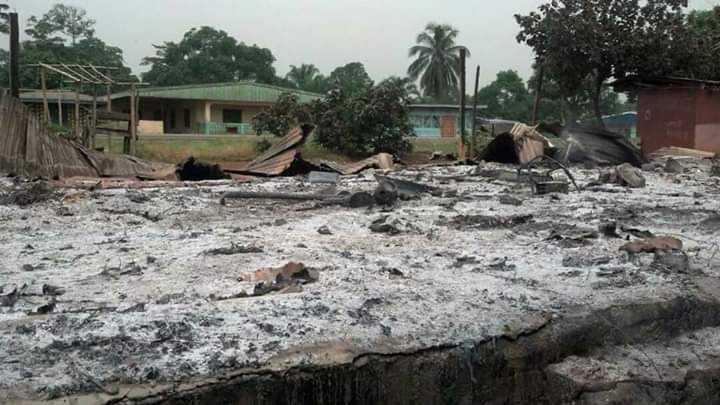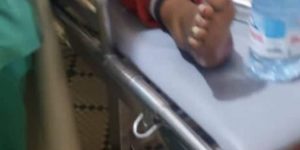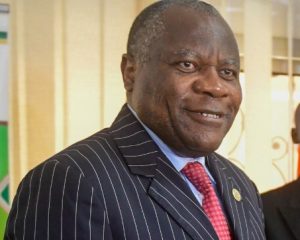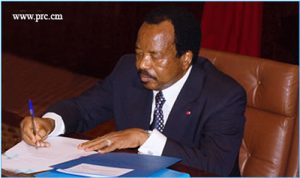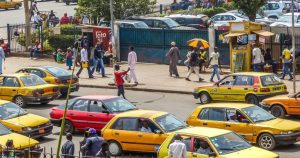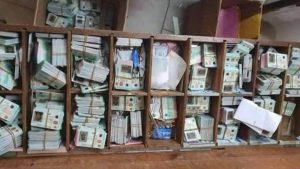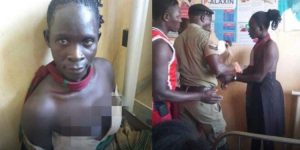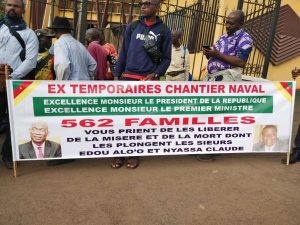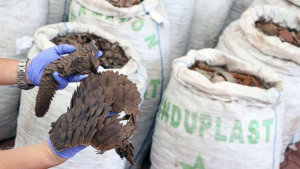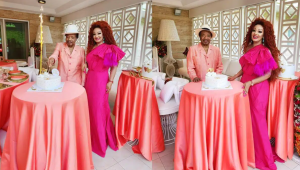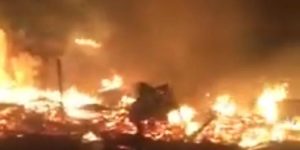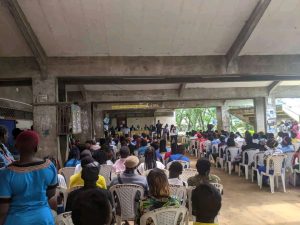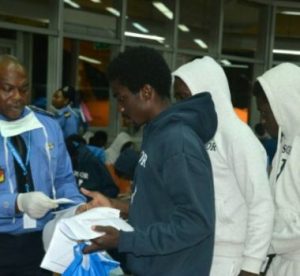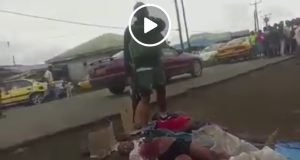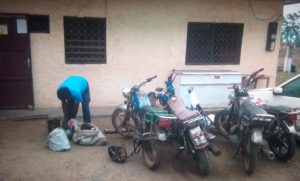Violence intensified in Cameroon since August 2019 when 10 extradited Ambazonia leaders were given life sentence by the Yaoundé military court following a flawed trial.
Human Rights Watch – HRW said at least 130 civilians have been killed in over 100 incidents since July, and thousands have been forced to flee.
This also includes people with disabilities who are at higher risk. These people are more likely to be exposed to danger from attacks because of barriers to escaping and staying out of harm’s way.
“As the crisis in the Anglophone regions shows no sign of slowing, people with disabilities are struggling to find safety and face heightened risks of attacks, displacement, and abandonment,” said Shantha Rau Barriga, disability rights director at HRW.
The commission has documented the experiences of people with disabilities who were unable to flee to safety, or were killed, assaulted and tortured by soldiers or armed separatists.
In one case, on September 19, Cameroonian security forces searching for armed separatists attacked a locality called “Number One Water” near the town of Muyenge, South-West region, killing four civilian men, including a man with an intellectual disability.
A witness to the attack said people fled when the military arrived and started shooting.
“I hid in the nearby bush and I went back when things calmed down, the same day. I found four bodies on the ground and helped bury them. Among those killed, there was a man called ‘Jasper,’ who had an intellectual disability, which is the reason why he stayed behind. The military killed him in front of his hut. His body was partly burned, because the military also set his hut on fire.”
In another case, a 65-year-old farmer with a physical disability saw soldiers from the Rapid Intervention Battalion (Bataillon d’intervention rapide, BIR) destroy at least seven homes, including his, when they attacked his village, Nchum, North-West region, on October 30.
“I hid near a spring when the military came,” he said. “I couldn’t run, because of my disability, and my family left me behind. I saw more than fifteen soldiers, who came with two vehicles. My house was well constructed, with cement blocks, and they burned it to the ground after throwing a grenade against it.”
The burning in Nchum occurred one day after the military attacked a nearby village, Muchweni, where the BIR burned homes in retaliation for an ambush to a military convoy by the separatists on October 28.
Voices of People with Disabilities from the Anglophone Regions
“Frank”
“Frank,” 27, who has a physical disability, was shot in the leg by government soldiers as he attempted to flee fighting between the Cameroonian military and armed separatists in his village, Mamu, in the South-West region, on July 29, 2019.
He said:
It was about 11 a.m. when the shooting started. I saw one military armored car and two military pickups. The soldiers were shooting towards my direction. I was trying to go back home to gather my family so we could all run to safety. But before I reached the house, I was hit by a bullet fired in the same leg which was already having a problem. I fell. I was bleeding. A friend rescued me and carried me on his shoulders to a nearby house.
“Frank” was later taken to the regional hospital in Buea, where he underwent surgery and was hospitalized for over three weeks.
“Alain”
On July 28, soldiers of the BIR raided Nkogho village, South-West region, and killed “Alain,” a 60-year-old man with an intellectual disability, in front of his house.
A witness said:
As the military invaded our village, everyone ran away for safety, but ‘Alain’ didn’t. He did not understand what was happening because of his disability. He was shot from behind, and the bullet exited near the heart. The soldiers also burned down his home. We buried him the following day.
Denis
Denis, a 30-year-old man from Lysoka village, in the South-West region, has lymphatic filariasis since 2013. It is a disease caused by a parasitic worm, transmitted by mosquitoes, which can cause tissue swelling and a physical disability.
Denis, a 30-year-old man from Lysoka village, South-West region, with lymphatic filariasis, a parasitic infection leading to severe swelling and permanent disability.EXPAND
Denis, a 30-year-old man from Lysoka village, South-West region, with lymphatic filariasis, a parasitic infection leading to severe swelling and permanent disability.
On August 12, 2019, he was abandoned in his home after fighting between the military and armed separatists in Lysoka.
He said:
The BIR soldiers and gendarmes clashed with a group of Amba boys [armed separatists]. It caused serious shooting, and I was home alone, sick. Everybody in the village ran away into the bushes, and nobody bothered to know my whereabouts. I stayed home until the gunfire stopped in the evening. I remained in the house alone for three days without food or medication. On August 15, some people started returning. That’s when they discovered that I had not escaped. They apologized to me and said it was too dangerous for them to return for me.… I cannot run when attacks occur. I feel as if I’m a burden to my family, both physically and financially.
Denis is still living in Lysoka despite the continuing violence. His elder brother provides for him. He has not received any humanitarian assistance.
Regina
“My family escaped to the bush, but I did not go,” she said. “I survived alone with the little that was left in the house. It was very difficult.”
She had fled fighting in October 2018 and caught typhoid from drinking dirty water in the forest. Since then, she decided that she would stay behind, including during attacks. Due to inaccessible terrain and lack of support, Regina is in danger, as violence continues around her village. She said that she was feeling increasingly vulnerable: “The worst consequence of this crisis is that I no longer appreciate life. I just wish to die so I can end my suffering. I prefer to stay in the house and just die there.”
Chrispu
Chrispu, a 75-year-old man from Ekona, South-West region, is blind and has a mental health condition and a physical disability. His daughter said that, at times, due to the violence, she had to abandon him at home in the deserted village for days, with little access to food and water:
On June 21, a mix of BIR, regular army soldiers, and gendarmes fought the Amba [separatists] in our neighborhood. There was gunfire and everyone ran away for safety. I had to leave my father behind. I couldn’t take the risk to carry him because I could have been killed if I didn’t run fast. I hid in the bush for one week. When I came back, I found my dad in very bad condition. He was very sick.
The crisis has strained family relations, as Chrispu is increasingly perceived as a burden. His younger brother said: “He’s like a heavy weight. We cannot be safe if we take him with us when we have to run away for safety.” Chrispu’s daughter said: “My father’s disability is a big stumbling block. When others are fleeing violence to seek refuge in safer areas, we cannot go. We have to stay to look after him. So, we are all stuck in an unsafe place.”
Cusmas
Cusmas, a 65-year-old blind man from Mautu village, South-West region, who lives with his wife and daughters, said that when attacks occur in his village, his family repeatedly faces the difficult choice of whether to help him at the risk of being killed or flee without him. He is often left behind.
One of Cusmas’ daughters said:
Whenever there is shooting, what comes first in my mind is my father. This is because we cannot do anything but to lock him alone in the house since we cannot carry him. I am always frightened whenever we are in the bush thinking that, when we come back home, we could find my father dead.
Accessing necessities, such as food and the latrine, is difficult for Cusmas when he is left alone. As a result, he is afraid and anxious.
Being deprived of my basic needs, struggling to find something to eat, feeling alone in dangerous place … all this has affected my spirit. Although I have a stick to help me moving, it is difficult to get to the toilet alone. I also need help to bathe. But the worst of all my worries is that I always feel that the military will one day burn me in the house alive. Before this crisis, I had challenges in moving and accessing services, but I didn’t have any fear. Now I am constantly afraid, and I tell my children that they should be ready to face the worst at any time.
As we join the rest of the world to celebrate the international human rights day, it is expedient to recount that every life matters and people will disabilities should equally be protected
They are at higher risk and more likely to be exposed to danger from attacks because of barriers to escaping and staying out of violence.
Curled from HRW report, international human rights day
°
°
°
When last did you invest in your future?
Let’s face it !
I’ve made millions online and I’m bent on showing you my mind-boggling secrets to brand and make money too.
Yes you can. I know it is too good to be true but you have to trust me first.
To begin CLICK HERE and see this package, if you’re still not convinced, kiss me good bye and leave
My name is Arrey Bate [ARREYB]

Since 2017, we have staked our lives to provide tailor-made news reports to our readers from war zones and hot political rivalries in Cameroon - And we do so for FREE.
As a small online media now reaching over 100,000 monthly readers on all our platforms, we have to rely on hiring a small team to help keep you informed
The best way to support our online reporting is by considering a measly sum for our team on the ground as little as $1. Now you can make a donation to us below, it only takes one click...
[sdonations]1[/sdonations]


